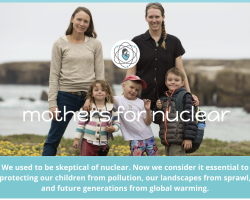Category of Content
Siting Experience Documents Only
Publication Date
Subject Matter
Keywords
The On-line Waste Library (OWL): Usage and Inventory Status Report
The On-line Waste Library (OWL): Usage and Inventory Status Report
Generic Repository Design Concepts and Thermal Analysis (FY11)
Generic Repository Design Concepts and Thermal Analysis (FY11)
Deep Borehole Laboratory and Borehole Testing Strategy: Generic Drilling and Testing Plan?
Deep Borehole Laboratory and Borehole Testing Strategy: Generic Drilling and Testing Plan?
Underground Research Laboratory Muon Detector Project Progress Report
Underground Research Laboratory Muon Detector Project Progress Report
Knowledge Management Analysis for Content Migration
Knowledge Management Analysis for Content Migration
Basis for Identification of Disposal Options for Research and Development for Spent Nuclear Fuel and High-Level Waste
Basis for Identification of Disposal Options for Research and Development for Spent Nuclear Fuel and High-Level Waste
Data to Support Development of Geologic Framework Models for the Deep Borehole Field Test
Data to Support Development of Geologic Framework Models for the Deep Borehole Field Test
Geological Distribution of Potentially Suitable Shale in the U.S.: Concepts and Literature
Geological Distribution of Potentially Suitable Shale in the U.S.: Concepts and Literature
Geologic Framework Models for the Alluvial Basin Reference Case
Geologic Framework Models for the Alluvial Basin Reference Case
Considerations of the Differences between Bedded and Domal Salt Pertaining to Disposal of Heat- Generating Nuclear Waste?
Considerations of the Differences between Bedded and Domal Salt Pertaining to Disposal of Heat- Generating Nuclear Waste?
Status of Shale Geology: Information on Extent, Thickness and Depth of Shale Deposits
Status of Shale Geology: Information on Extent, Thickness and Depth of Shale Deposits
Nuclear Waste Facility Siting Experience Database Content and Structure
Nuclear Waste Facility Siting Experience Database Content and Structure
Implementation of Baseline Services of the NWM IT Cloud Environment
Implementation of Baseline Services of the NWM IT Cloud Environment
Report on Characterization of Electrorefiner Salt to Assess Direct Disposal
Report on Characterization of Electrorefiner Salt to Assess Direct Disposal
Deep Borehole Disposal Research: Geological Data Evaluation, Alternative Waste Forms, and Borehole Seals
Deep Borehole Disposal Research: Geological Data Evaluation, Alternative Waste Forms, and Borehole Seals
A Salt Repository Concept for CSNF in 21-PWR Size Canisters
A Salt Repository Concept for CSNF in 21-PWR Size Canisters
A Salt Repository Concept for CSNF in 21-PWR Size Canisters, Rev 2
A Salt Repository Concept for CSNF in 21-PWR Size Canisters, Rev 2
Mothers for Nuclear Flyer
Mothers for Nuclear Flyer
Mothers for Nuclear Informational Flyer
Guidance for Creating a Community Benefits Plan for Regional Direct Air Capture Hubs
Guidance for Creating a Community Benefits Plan for Regional Direct Air Capture Hubs
This document is intended to provide supplemental information to assist applicants developing a Community Benefits Plan (CBP) for the Regional Direct Air Capture Hubs. As shown in the graphic to the right, Community Benefits Plans are based on a set of four core interdependent policy priorities: engaging communities and labor; investing in America's workforce; advancing diversity, equity, inclusion, and accessibility; and implementing Justice40.
Socio-technical multi-criteria evaluation of long-term spent nuclear fuel management strategies: A framework and method
Socio-technical multi-criteria evaluation of long-term spent nuclear fuel management strategies: A framework and method
In the absence of a federal geologic repository or consolidated, interim storage in the United States, commercial spent fuel will remain stranded at some 75 sites across the country. Currently, these include 18 “orphaned sites” where spent fuel has been left at decommissioned reactor sites.
The Social and Ethical Aspects of Nuclear Waste
The Social and Ethical Aspects of Nuclear Waste
Nuclear waste management seems to exist in a perpetual state of crises. For 50 years the nuclear states of the world have fought, and generally lost, the battle to deal with the nuclear waste problem. Worldwide, there is a growing acknowledgement within industry and government that social and ethical issues are just as important as technical issues when developing safe programs for nuclear waste management. This paper is a review of some of the outstanding social and ethical issues that are influencing discussions on nuclear waste management around the world.
Shared Yet Contested: Energy Democracy Counter-Narratives
Shared Yet Contested: Energy Democracy Counter-Narratives
Conventional ways of communicating about the transition to renewable energy in North America presuppose that energy systems can be changed while sustaining existing social, political, and economic relations. Energy democracy counters such ostensibly apolitical narratives by emphasizing the socially transformative potential of this transition. Yet energy democracy, as both organizing principle and social movement, is itself increasingly recognized as flexible and contested.
Policies for Achieving Energy Justice in Society: Best Practices for Applying Solar Energy Technologies to Low-Income Housing
Policies for Achieving Energy Justice in Society: Best Practices for Applying Solar Energy Technologies to Low-Income Housing
Studies indicate that the energy burden — energy costs as a percentage of annual family income — on low-income families is inordinately high, compared to that of the rest of the population. Rising fuel costs exacerbate this problem. Residential solar energy systems can help address this situation by furnishing a price-stable energy source with the added benefit of reduced greenhouse gas emissions. However, without appropriate incentives, these systems are prohibitively expensive for low-income families.
Public controversies and the Pragmatics of Protest: Toward a Ballistics of collective action
Public controversies and the Pragmatics of Protest: Toward a Ballistics of collective action
By using long run case studies and comparative analysis, I will address different processes by which alerts and criticisms are taken seriously by different actors and lead them to transform or to defend devices, norms and institutions. To deal with this kind of process, I will present an analytical model which runs on the recent controversies about radioactivity, GMOs and nanotechnologies. For many years, these fields have been marked by struggles in which scientific arguments are seldom dominant but are nevertheless relevant.

